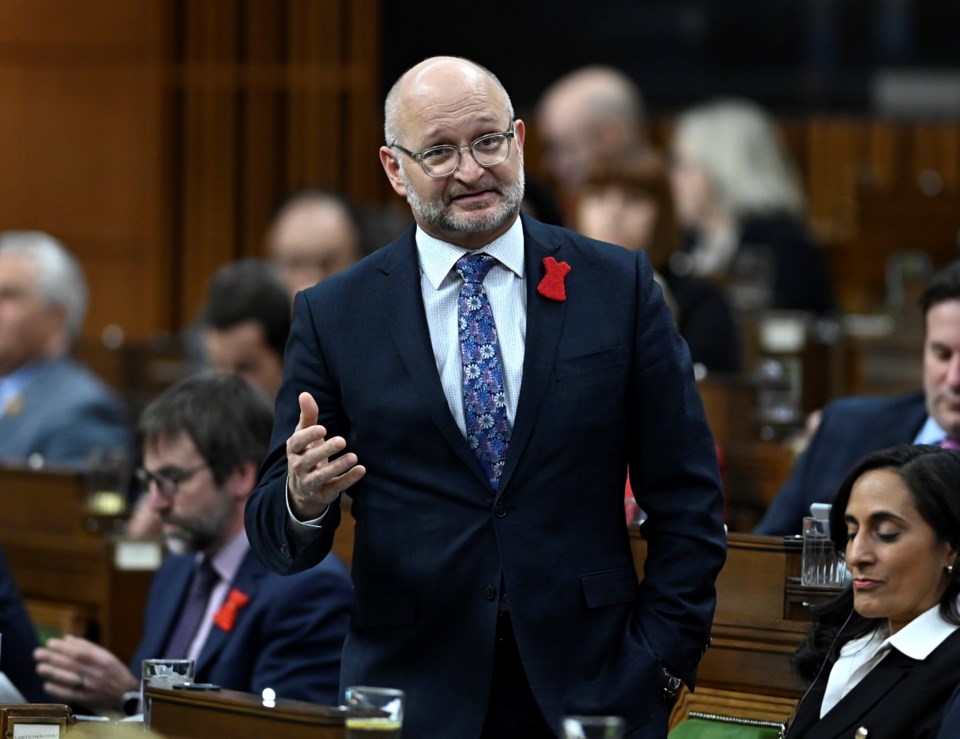EDITOR’S NOTE: This article originally appeared on The Trillium, a new Village Media website devoted exclusively to covering provincial politics at Queen’s Park.
Canada's justice minister is expecting his Conservative provincial counterparts to be pleased by the Trudeau Liberals' toughening up of bail conditions for serious offenders.
In an interview with The Trillium at the 2023 National Liberal Convention a few days ago, Canada's Justice Minister and Attorney General David Lametti also affirmed that the federal government will be introducing proposed changes to bail law in the Criminal Code before the House of Commons takes its summer break in about a month and a half.
The move by Prime Minister Justin Trudeau's government is promised to come following months-long public and private lobbying efforts by provincial governments to make it harder for violent and repeat offenders to qualify for release from jail while they await a trial.
Violent crime by someone allegedly breaking bail or peace bond conditions has increased in recent years in the Greater Toronto Area as well as Ontario more widely, according to Statistics Canada data. Several high-profile examples of this attracted Premier Doug Ford's government's attention over the last few months, placing it at the forefront of the push for stricter bail conditions.
Lametti said he feels he's "certainly on the same page" with the provincial attorneys general and public safety ministers "in terms of (the) direction" his proposed changes will go.
He also said there's a "good degree of support" from each of the federal parties with seats in the House of Commons. "So I'm optimistic that we might be able to move it through expeditiously," Lametti said.
Lametti and federal Public Safety Minister Marco Mendicino met with the provincial and territorial ministers responsible for justice and public safety on Oct. 12 and 13 in Dartmouth, Nova Scotia. Following these meetings, "all the justice departments across Canada" began working together by November of last year to come up with ideas on bail reform, according to Lametti.
With bail law being a federal responsibility, the Trudeau government looked at how it could change Canada's Criminal Code. It "committed to ... seeing if we could add one, or two, or a few reverse onuses," Lametti said.
"So instead of the Crown having to show why a person ought not to get bail, when you reverse the onus the (accused) person has to show why he, let's say, wouldn't be a threat to public safety," Lametti explained. "It changes the starting position and it sends a signal that we want the person — a justice of the peace, a judge, or whoever's acting on the bail hearing — to send a message to that person that we take these kinds of crimes seriously."
Adding new types of reverse onus requirements for repeat offenders and individuals accused of violent crimes were the two examples Lametti gave.
He called this work a "complex challenge," given the strong legal protection of bail for people accused of crimes in Canada. Section 11 of the Charter of Rights and Freedoms asserts that someone charged with a crime in Canada has the right to "be presumed innocent until proven guilty" and "not be denied reasonable bail without just cause."
Canadian courts have upheld Section 11 rights against various past challenges and cited it to strike down certain past reverse-onus requirements that federal parliaments have passed.
The Criminal Code does currently include reverse onus requirements for bail for people accused of numerous crimes, most of which are among those considered most serious in Canada, like murder and attempted murder, serious sexual and weapons crimes, and certain re-offences, according to a federal government website.
On Dec. 27 of last year, after the federal, provincial and territorial governments agreed to look into ways to reform Canada's bail system, OPP Const. Grzegorz Pierzchala was shot and killed while responding to a call in Hagersville. One of the two individuals charged in his killing was previously convicted of a serious crime and was on bail at the time of the shooting, despite other outstanding charges.
All 13 of Canada's premiers were signatories of a letter sent to Trudeau on Jan. 13 that urged the federal government to take "immediate action" to strengthen bail requirements and singled out a call to create a reverse onus on bail for anyone accused of possessing an illegal firearm.
Five days later, Ontario's justice policy committee agreed to a push led by Progressive Conservative MPPs to study bail system reforms, focusing on "persons accused of violent offences or offences associated with firearms or other weapons." The report produced by PC, NDP and Liberal MPPs was tabled in the Ontario legislature in March and suggested 12 ways that the federal and provincial governments could strengthen the bail system.
On March 10, the federal, provincial and territorial ministers responsible for justice and public safety met again in Ottawa to discuss "Canada's bail system and ways to better address challenges facing (the) bail system," as a press release from the federal government described it.
On April 5, 89 PC, NDP and Liberal MPPs passed a motion from Solicitor General Michael Kerzner to formally call on the federal government "to immediately reform the Criminal Code of Canada to address the dangers facing our communities and implement meaningful bail reform to prevent violent and repeat offenders from being released back into our communities."
Lametti also commended provincial governments — highlighting Ontario, British Columbia and Manitoba, specifically — for new funding commitments they've made that are aimed at improving the administration of justice systems in Canada.



